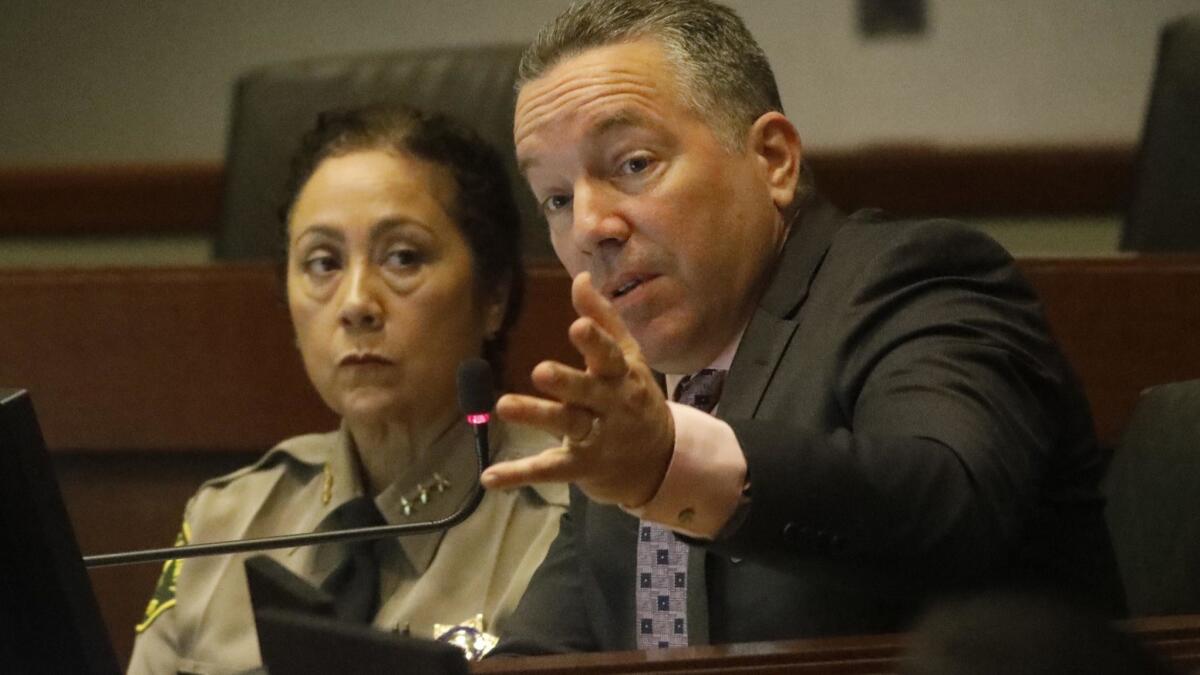Op-Ed: County supervisors need to get creative to rein in Sheriff Villanueva

The Los Angeles County supervisors are facing a familiar problem: how to oversee the work of a county sheriff whose judgment they don’t trust.
Since winning an upset electoral victory last fall, Sheriff Alex Villanueva has done little to assure responsible people that he has any business running the nation’s largest sheriff’s department. He’s formed a ridiculous “truth and reconciliation commission” that’s little more than a pretext for reinstating deputies who had been fired. He’s thumbed his nose at reforms that had been improving the management of the jails. And just last week, he allowed the East Los Angeles sheriff’s station to resume branding itself as “Fort Apache,” a moniker his predecessor disallowed for its implication that the station was an outpost in hostile territory — not exactly a symbol of community policing.
It’s clear from his public actions and statements that Villanueva is bullish and not too bright, and that should make anyone who cares about accountability in law enforcement nervous. For the Board of Supervisors, it creates a special challenge. The trouble, as boards of yore long ago discovered, is that the supervisors have an intense interest in the conduct of the sheriff, but they can’t do much about it.
The supervisors have only one power over the sheriff: They control his budget. That’s a serious lever, but a difficult one to pull effectively.
That’s in notable contrast to the Los Angeles Police Department. There, the chief of police is appointed by the mayor and serves at the pleasure of the Police Commission, whose five members are appointed by the mayor and confirmed by the City Council. The chief can serve only two five-year terms. LAPD policy is guided by the chief but is the responsibility of the commission, which employs an inspector general with broad authority to investigate allegations of wrongdoing. That structure, important pieces of which were approved by city voters after the Christopher Commission recommended them decades ago, provide the LAPD with imperfect but coherent civilian oversight.
Not so for the sheriff. As an elected official, the sheriff is answerable to voters, not the board of supervisors. A county inspector general and citizens’ commission provide the trappings of civilian oversight, but not the substance. No civilian official or board can discipline the sheriff, much less remove him from office.
That’s tested the patience of the supervisors before. Sheriff Sherman Block exasperated the board with his long and sometimes imperious reign before dying after a slip in a bathtub. Sheriff Lee Baca beat the dead Sherman in 1998 (some supervisors supported Block, who was still on the ballot, figuring that if he won, they could name his replacement). Baca touted reform but was charged with obstructing a federal investigation into the jails and convicted of lying in that probe. He’s looking at prison. And Jim McDonnell, who followed Baca, was a seasoned professional and LAPD veteran, but not a political ace: Villanueva came out of nowhere to beat him last November, upending McDonnell’s efforts to rebuild after Baca and throwing the department’s mission and direction into doubt.
Still, the supervisors have only one power over the sheriff: They control his budget. That’s a serious lever, but a difficult one to pull effectively. The supervisors can’t line-item veto the sheriff’s budget. No matter what they think of Villanueva’s “truth and reconciliation commission” — and they correctly view it as a joke — they can’t simply defund it.
Yes, the supervisors could threaten to slash the sheriff’s total budget unless Villanueva agreed to certain principles of reform and oversight — but that’s an awfully blunt instrument. Cutting overall spending could affect the department’s ability to patrol unincorporated areas or to provide services to its contract cities, places such as Malibu and West Hollywood that hire the sheriff’s department to patrol their communities.
What, then, is a supervisor to do?
“To some extent, we’ve been flummoxed,” Supervisor Sheila Kuehl said in an interview this week.
So far, she said, the supervisors have focused on two areas: civil service rules and the county’s authority over its workforce. Villanueva’s goofy “truth and reconciliation” commission — “an insult to South Africa,” Kuehl called it — has circumvented county rules for hiring and firing employees. The supervisors are challenging Villanueva’s authority in that area by taking him to court.
Enter the Fray: First takes on the news of the minute from L.A. Times Opinion »
Meanwhile, with less fanfare, the supervisors are exploring their legal authority over not just the sheriff’s budget but, more specifically, the portion that goes to personnel. “Everyone in the county works for us, not the departments,” Kuehl said. Supervisors do not choose who gets hired for specific jobs, but they do set the number of positions to be filled and salary levels, giving them significant leverage.
The board also has considerable soft power. County supervisors are elected officials, too, with constituents who can be mobilized. That includes the 42 cities that contract with the sheriff’s department for law enforcement patrols. Some of those city leaders already have voiced concern about the services they are receiving and about Villanueva’s insistence on rehiring deputies with checkered histories. The cities are customers and hold the power that goes with paying for service.
The struggle to direct a sheriff is nothing new, but Villanueva’s actions call for a creative response by the board. It would be a tragedy if the sheriff’s department, so long hampered by misconduct and sloppy management, were to backslide on the progress of recent years because yet another sheriff was allowed to slip the reins of authority.
Jim Newton, a former editorial page editor of The Times, is editor in chief of Blueprint magazine at UCLA. He also serves as contributing editor of the Police Assessment Resource Center, which features more of his work on police accountability.
Follow the Opinion section on Twitter @latimesopinionand Facebook
More to Read
A cure for the common opinion
Get thought-provoking perspectives with our weekly newsletter.
You may occasionally receive promotional content from the Los Angeles Times.











